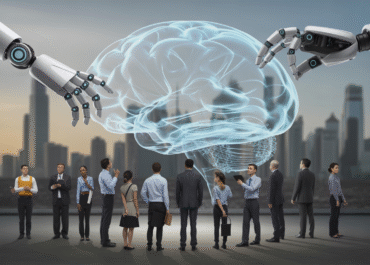Intelligent Automation: How AI is Reshaping Business Operations
In today’s rapidly evolving business landscape, the pursuit of efficiency, accuracy, and innovation is relentless. While traditional automation has long been a staple for streamlining repetitive tasks, the advent of Intelligent Automation (IA) marks a significant leap forward. IA combines the power of Artificial Intelligence (AI), Machine Learning (ML), and Robotic Process Automation (RPA) to not only automate processes but also to learn, adapt, and make intelligent decisions, fundamentally transforming how businesses operate.
This paradigm shift goes beyond simply mimicking human actions; it empowers systems to interpret, analyze, and act on complex data, leading to unprecedented levels of productivity and strategic advantage. Companies are no longer just automating; they are making their operations smarter.
The Core Pillars of Intelligent Automation
Intelligent Automation isn’t a single technology but a synergy of several advanced capabilities:
- Robotic Process Automation (RPA): Automates repetitive, rules-based tasks by mimicking human interactions with digital systems.
- Artificial Intelligence (AI): Enables machines to simulate human intelligence, including problem-solving, learning, and understanding.
- Machine Learning (ML): A subset of AI that allows systems to learn from data without explicit programming, improving performance over time.
- Natural Language Processing (NLP): Allows machines to understand, interpret, and generate human language, crucial for handling unstructured data like emails and customer queries.
Together, these technologies create systems that can handle exceptions, adapt to new scenarios, and even predict outcomes, pushing the boundaries of operational excellence.
Transforming Key Business Functions
The impact of Intelligent Automation reverberates across nearly every business function:
- Process Optimization & Enhanced Efficiency: IA streamlines workflows, reduces manual errors, and accelerates processing times across departments. From invoice processing to onboarding new employees, tasks that once took hours or days can now be completed in minutes, freeing human capital for more strategic endeavors.
- Superior Decision-Making: AI and ML can analyze vast datasets at speeds and scales impossible for humans, uncovering patterns and insights that inform better strategic decisions. This leads to more accurate forecasting, optimized resource allocation, and proactive risk management.
- Revolutionizing Customer Experience: Chatbots and virtual assistants powered by IA provide instant, personalized support 24/7, resolving queries efficiently and improving customer satisfaction. IA also enables hyper-personalization in marketing and sales by analyzing customer behavior.
- Cost Reduction & Scalability: By automating high-volume, low-value tasks, businesses can significantly reduce operational costs. IA also offers unparalleled scalability, allowing companies to quickly adjust to fluctuating demand without proportional increases in staffing.
Industry-Specific Applications of IA
Intelligent Automation is not a one-size-fits-all solution; its applications are tailored to specific industry needs, as highlighted by various industry leaders:
- Finance: IA is critical for fraud detection, risk assessment, automated compliance checks, and faster loan processing. It enhances security and regulatory adherence while speeding up transactions.
- Healthcare: From automating administrative tasks and patient scheduling to assisting in diagnostics through AI-powered image analysis and personalizing treatment plans, IA is improving patient care and operational efficiency.
- Retail: IA optimizes supply chain management, predicts consumer trends, automates inventory management, and enables personalized shopping experiences, leading to reduced waste and increased sales.
- Manufacturing: Predictive maintenance, quality control, and optimizing production lines through AI-driven insights are leading to smarter factories and significant operational savings.
Navigating the Future with Intelligent Automation
While the benefits are clear, successful implementation of Intelligent Automation requires strategic planning. Businesses must consider data quality, cybersecurity, ethical implications of AI, and the critical need for workforce upskilling. The goal is not to replace human workers but to augment their capabilities, enabling them to focus on tasks that require creativity, critical thinking, and empathy.
Ultimately, Intelligent Automation is more than a technological trend; it’s a fundamental shift in how businesses create value. By embracing IA, organizations can unlock new levels of efficiency, foster innovation, and build a more resilient and competitive future in the digital economy. The journey towards a fully intelligent enterprise is underway, promising a future where operations are not just automated, but truly intelligent.


